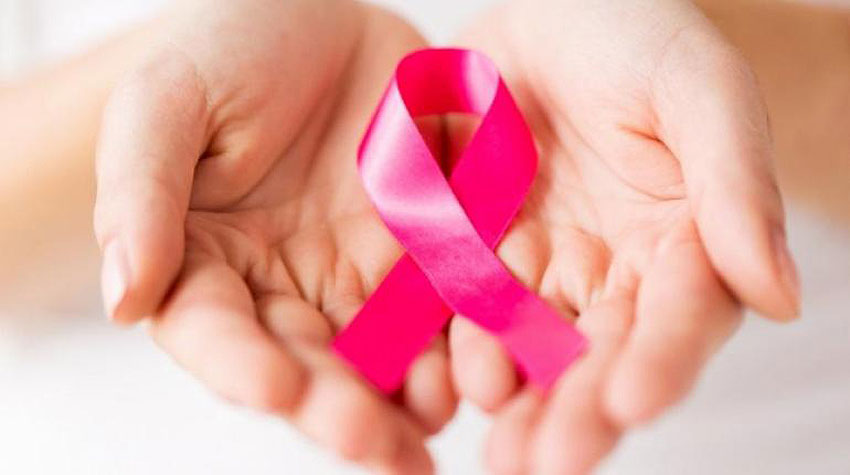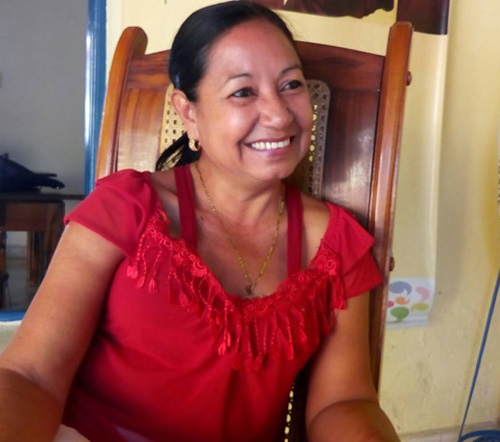
She is a warrior in all directions; one of those who fights her own battles without much noise. She knows how to reinvent motifs and see colors where others would only perceive muted shades. So common and yet so singular is Bárbara Mendoza Vázquez, a breast cancer survivor for 17 years now.
"It's not every day that a mother and daughter are diagnosed with the disease in the same period of time, is it? Well, my mother and I had to go through that difficult time," she says, fully aware of the complex path she had to follow. Although her eyes show the sensitive woman who inhabits her, her voice does not break, but rather transmits strength.
"She suffered for my condition and I for hers. They operated on both of us the same day, foreseeing that one of us would give up on taking care of the other. Unfortunately, my mother did not have the same fate as I did; she metastasized and died within a year. For Barbara, that was a very hard blow. Nevertheless, giving up was never an option: she had three children to fight for.
We have forgotten that curing cancer begins with preventing it. (David Agus, renowned American oncologist)
 More than five thousand people are living with cancer in Las Tunas today. According to Ana Rosa Brizuela, coordinator of the provincial program, the most affected are over 60 years old and the location of the highest incidence is the skin.
More than five thousand people are living with cancer in Las Tunas today. According to Ana Rosa Brizuela, coordinator of the provincial program, the most affected are over 60 years old and the location of the highest incidence is the skin.
"Since 2009, this pathology leads to the causes of mortality in the population of Tunas. Annually, about 1,300 people die from different types of tumors, with prevalence for lung, colon, prostate and breast. The aging population and inadequate lifestyles influence this.
The specialist says that, despite the fact that the diagnoses are prevalent in elderly patients, there is concern about the rise of the pathology in younger people, especially oral and skin cancer, as a result of unhealthy practices from adolescence.
Advances in the field of oncology show that many of the triggers can be avoided with healthy styles. Sustained stress and inadequate nutrition, mainly the consumption of chemically sprayed food, increase the risk of cell mutations and lead to disease.
The specialist recommends a diet low in animal fat. She also advises to avoid alcohol and cigarette consumption, to respect the non-smoker and to perform physical activity. She suggests protected sexual relations, since the human papillomavirus has a great influence on the appearance of cervical cancer.
The Health System has conceived a program of control, prevention, timely diagnosis, treatment and palliative care. Each health area has personnel trained to detect the signs through research or at the request of the patient who perceives some symptoms.
There are several initial diagnostic means, such as the fecal occult blood test (Sumasohf) to determine rectal cancer. Prostate-specific antigen (PSA), to identify prostate cancer, and x-rays to define lung cancer and others are also available.
At the same time, the Early Detection of Cervical Cancer Program works, through cytological and breast tests, with the examination of women over 30 years of age, mainly those with maternal antecedents.
"If a tumor is suspected, a referral is made to the multidisciplinary consultations provided by the Secondary Care Service, which includes oncologists, radiologists, psychologists, pathologists, surgeons, proctologists, dermatologists, etc. This is where the procedure to be followed is defined," Brizuela said.
TIME IS LIFE
"Despite the US blockade against Cuba, we have not suspended any chemotherapeutic or rehabilitative procedures for cancer patients. Radiotherapy continues to be provided on a regional basis in the provinces of Holguín and Camagüey," continues the specialist.
For these men and women, every minute counts. It is just as necessary to prevent, to diagnose in early stages as to treat the condition without delay. However, dissatisfaction persists among those who require the radiotherapy service.
"There are provinces that have implemented a system for the transfer of patients," says Brizuela, "who are attended to immediately at the regional centers. The authorities in Holguín and Camagüey are willing to give priority to our patients, but there are no means of transporting the 20 or so people affected every day.
It's up to the patients to join a waiting list to receive treatment. "There are patients who are at a less advanced stage, with a greater chance of survival, but the delay in applying this procedure considerably reduces survival.
In a very sensitive subject, it is urgent to review the issues that threaten the vitality of this noble program, because only two territories of the island do not have this service, and one of them is Las Tunas.
Once you choose hope, everything is possible. (Christopher Reeve, American actor, film director and activist)
Currently, there are several alternatives for treating this condition, some of which are high-tech and are applied at Hermanos Ameijeiras Hospitals and the Medical-Surgical Research Center (Cimeq), in Havana, with prior coordination. "We are talking about the High-Intensity Focused Ultrasound (HIFU), which destroys the millimetric cells, especially those of the liver, pancreas and uterine myomas, and which have criteria to undergo the procedure.
"We have the PET/CT, which is diagnostic and therapeutic, used to evaluate the response to the different treatments and plan the radiotherapy. The same is the Hyperthermic Intra Peritoneal Chemotherapy (HIPEC), used in peritoneal carcinomatosis, which allows at the same time of surgery to give thermal chemotherapy, among others", concludes the expert.
The Balcony of Eastern Cuba has several clinical trials that reveal positive results and a promising future. Like all research, they respond to various protocols with inclusion criteria and always with the agreement of the affected person.
Cancer opens many doors. One of the most important is your heart. (Greg Anderson, American musician and victim)
Barbara was only 36 years old when she got the news. The first impact she managed to overcome with a positive attitude and great faith. "I understood that I had to be brave for my mom, for my kids and for me. Ten years later, I was told that I had a new tumor in my other breast and I faced this process again with a lot of energy, so much so that I decided to have a reconstruction.
She declares herself to be a happy woman and tries to spread her joy to those around her. "One learns to get the good part out of things and today I feel a better person, more sensitive to other people's pain and not only to those who suffer from this condition, but in all aspects".
Cancer is not synonymous with death, a timely diagnosis increases the chances of cure; there are the stories of Barbara and so many other winners. It is an attitude, a small detail that can make a big difference, in the sick and in the healthy.
Precisely, the Day of the Fight against Illness, which will last until next March, promotes a suggestive motto: "I am... and I will...". It means that in the hands of you, of me, of him... is the possibility of changing in favor of health and of one's own life.





